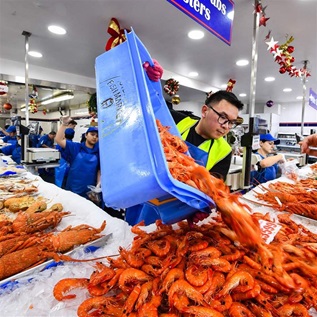European Shark Week round up
People across Europe came together to call for stronger shark protection during European Shark Week from 11-19 October. During the week, 79 events and over 230 activities took place in 10 European countries, and a huge number of Europeans signed our petition calling on fisheries and environment ministers to promote a strong European Plan of Action for sharks.

An underwater treasure hunt in the Netherlands, an underwater shark photo exhibit in Germany, and sleepovers with sharks in Spain were among the more innovative events of the week. In addition, inspiring talks, exciting debates and fascinating film viewings took place at marinas, schools and aquariums around Malta, Italy, France, Poland, Portugal, Sweden and the UK.
Around 86,000 people from around Europe have signed the Shark Alliance petition, 10,731 of which were online petitions! The petition calls on European fisheries and environment ministers to promote a strong European Plan of Action for sharks.
Shark Alliance members will be presenting the signatures to their country's ministers during January and February.
In France, European Shark Week was launched with a special conference held at the prestigious Oceanographic Institute in Paris, where shark expert Dr. Bernard Séret captivated the audience with a talk on the biology of sharks and related species. Read more
Activities continued all week at aquariums from Brittany to the South of France, with exhibitions organized in Paris, at Seaquarium in southern France, La Rochelle, and by the Chartres Diving Club.
Water temperatures hampered an attempt to set a world record for the greatest number of divers in the water at the same time, but the underwater treasure hunt proceeded as planned at the Vinkeveense Plassen in the Netherlands - quite a feat with 4-5 metres visibility. Participants even signed the petition underwater! WWF helped generate interest in shark conservation throughout the week with events at Rotterdam Zoo.
In Italy, European Shark Week got off to a great start through a well-attended event in Palermo. At Genoa's Civic Museum of Natural History, Milan's Aquarium, and Rome's Zoology Museum, visitors were treated to a screening of Rob Stewart's film Sharkwater and a lecture from experts from the Group of Italian Researchers on Sharks, rays and chimeras (GRIS), Centro Turistico Studentesco e Giovanile (CTS) and Medsharks.
Italy's events culminated with a meeting between representatives from Marevivo and the Shark Alliance and Paolo Russo from the Ministry of Agriculture and Fisheries. Russo said, "Shark conservation represents a noble and selfless act that, apart from avoiding pointless cruelty, it also prevents distortion to the marine ecosystem. We will urge the European Commission to adopt adequate measures."
Shark Alliance members Deepwave and Deutsche Elasmobranchier-Gesellschaft (DEG) launched European Shark Week inGermany at the tropical aquarium in Hagenbec where enthusiastic visitors queued to sign the petition.
Germany's events continued throughout the week, among them an underwater shark photo exhibition in a swimming pool in Wirges, a slide show in Osnabrück, and activities at the German Marine Museum in Straslund. A popular drawing competition at the University of Hamburg's zoological museum concluded the week.
In Sweden, the famous animal expert, Jonas Wahlström, and popular bloggers promoted European Shark Week events at aquariums in Stockholm and Gottenburg, and the Marine Biology Centre in Lysekil.
In Malta, Sharkman and Nature Trust Malta collected photos and petition signatures at the marina, in schools, and at the market. The film Stewards of the Reef was shown on national television on the eve of the launch of European Shark Week and, although Nature Trust Malta had to postpone their university showing of Sharkwater due to flooding, they were overwhelmed by the enthusiasm of interested students.
European Shark Week also went to Gdynia Aquarium in Poland, where visitors were keen to learn about sharks. The biggest attractions were a film about sharks and a guided tour around the shark tank.
Thirteen aquariums in Spain and Portugal hosted a tremendous number of European Shark Week activities throughout the week.Read more
In Barcelona, a scientist from Submon gave a talk at the University, sparking interest in the petition and photo wall. In Premià de Mar, researchers from the Cram Foundation's Recovery Centre educated visiting school children and other citizens about shark issues.
Myriad activities also took place in Ireland and across the UK from Scotland to Cornwall at universities, aquariums, and even shopping centres.
We were especially proud that European Shark Week received official mention in the Scottish Parliament:
"The Parliament notes that 11 to 19 October 2008 is European Shark Week; is concerned at the dramatic decline in European shark numbers; is further concerned that most Scottish shark species are classed as critically endangered but that none is currently afforded any protection…"











